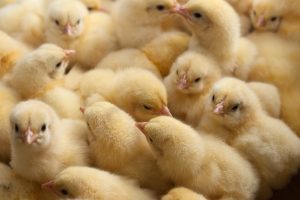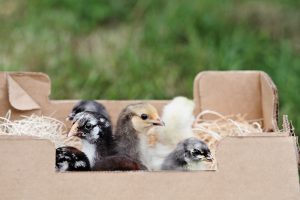Due to human SARS-CoV-2 (COVID-19), vaccination is constantly in the news and on the minds of people worldwide. Fortunately, scientists have developed effective vaccines that either prevent or reduce the severity of this sometimes-fatal disease.
Chickens are also fortunate. Although they don’t get COVID-19, they can contract Marek’s Disease, Coccidiosis and many other ailments that can kill them. Science has developed vaccines and medications to help keep diseases from devastating a flock.
Much of what we’ve learned about preventing human COVID-19 applies to many diseases that weaken or kill chickens. In order to sicken or kill either a person or chicken a disease must reach a vulnerable population. People are mobile and interact with others every day at work, school, in stores, or at theaters and events. With so much contact the disease easily spreads from one person to another. Anyone completely isolated from a carrier won’t get the disease, but few people want to live hermit-like lives isolated from others.

In contrast, a small chicken flock can happily live isolated from others, making disease transmission unlikely. Most chickens started life in a hatchery where chicks are taken from incubators and shipped to customers. Hoover’s Hatchery participates in the Department of Agriculture’s National Poultry Improvement Plan. It practices sanitation and disease prevention, so the box of chicks heading out to a customer is almost certainly disease free.
Although chicks leave the hatchery in good health when they arrive at their future home they often become exposed to many potential ailments. Medication and vaccination can prevent them from contracting Marek’s Disease and Coccidiosis.
Marek’s is a highly contagious viral disease named for Hungarian Jozeph Marek. If vaccinated in the hatchery shortly after hatching they’re less likely to contract it. Coccidiosis is caused by a protozoon, but medication can be mixed in chick feed to reduce its likelihood or given to them at the hatchery before they are shipped.
Like human COVID-19 the two chicken diseases are highly contagious, but there’s good news for the backyard flock. It’s easier to protect a few hens from infection than it is for people to prevent COVID-19. The secrets to good health are isolation and sanitation, sometimes augmented by medicine. For peace of mind Hoover’s Hatchery, on request, will vaccinate chicks for Marek’s Disease and treat them for coccidiosis. Customers can also buy medicated starter mash designed to prevent coccidiosis but not other ailments.
Is it wise to vaccinate and medicate? Most customers can skip it, and their chickens will be healthy. However, there are situations where treatment is important. Location is important. Diseases can lurk for years and seemingly come from nowhere when new chickens arrive. If someone is establishing a flock in a place that once housed chickens, even years ago, it is probably wise to augment sanitation with medication. It also is wise to treat chicks if the flock will be housed near other flocks.

Practicing sanitation and isolation makes it likely that chickens will be amazingly healthy. Vaccination adds a degree of safety. Other health tips include:
- Keep the coop dry and clean.
- Give chickens plenty of room and fresh air. Crowding encourages disease.
- Avoid introducing diseases by:
Not adding new chickens into the flock. The newbie might bring sickness.
Sanitizing shoes, clothing and washing hands thoroughly after visiting
someone else’s chickens. People can carry disease from one flock
to another.
- Provide fresh nutritious feed and clean water.
The Hoover’s Hatchery catalog includes two pages of information on how to reduce illness caused by salmonella. Follow the advice and odds are very good that both chickens and people will enjoy robust health.